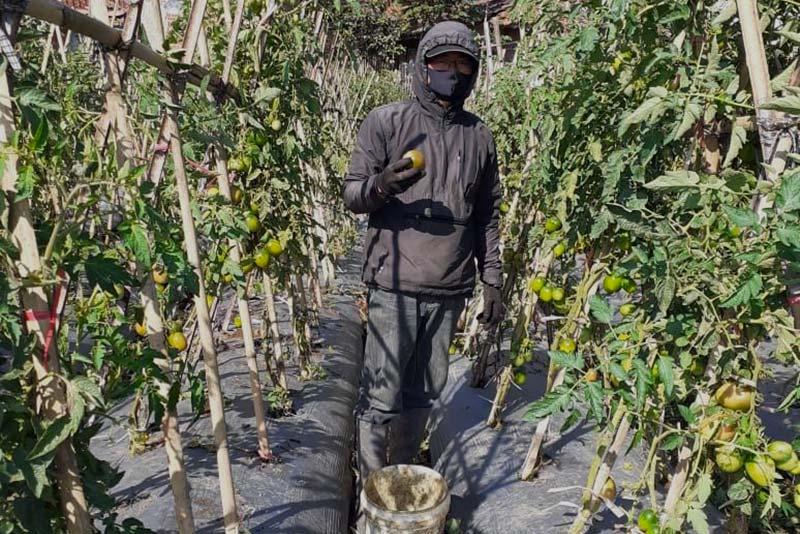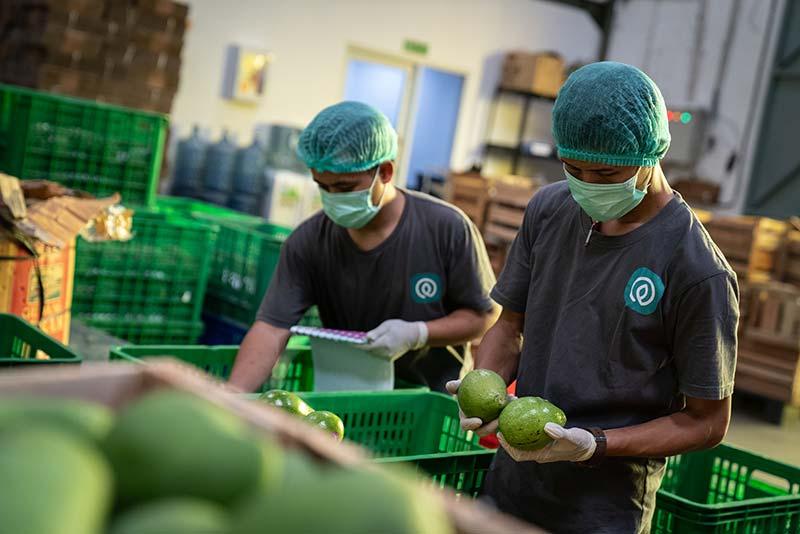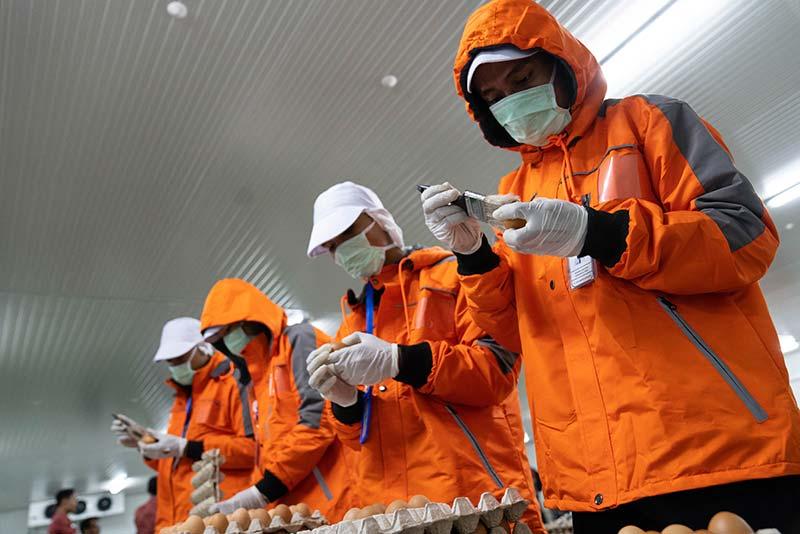“People are at home and markets are empty.” That is how Cahyono Kurnia, a tomato farmer from Ciwidey in West Java, sums up the COVID-19 situation. Farmers in this Indonesian province on the island of Java — extending south and east of Jakarta — rely on traditional markets, but large-scale social restrictions are making it difficult to deliver goods, severely impacting the livelihoods of farmers across the country.
Agriculture, one of the key sectors in Indonesia, is also the main source of employment in rural areas, employing around 40 million Indonesians. Over 85 percent of those engaged in agriculture are smallholders — farmers with less than two hectares of land — who are unable to tap into the opportunities offered by Indonesia’s economic growth. Their lack of access to markets has been worsened even further by the global pandemic.
But Dani Ramdani, who farms lemons, tomatoes, chilis, and peppers in West Java, has been more fortunate, and he attributes this to his association with TaniHub, a digital marketplace that connects small-scale producers of produce, eggs, and other staples to hotels, supermarkets, and restaurants. TaniHub’s staff and agents help farmers improve their productivity and the quality of goods and also handle the logistical hurdles of getting them to markets—even during pandemic-related lockdowns, when traditional markets operate only a few hours per day.

Tomatoes are ready for harvesting at Cahyono Kurnia’s farm in Ciwidey, West Java province.
“Farmers in my region, Pangalengan, have been heavily impacted, but fortunately, we—who supply to TaniHub—are certain that our products will be bought,” Ramdani says. “Farmers who rely solely on traditional markets are facing much more difficulties.”
TaniHub, part of Tani Group, was launched in 2016 by seven young social entrepreneurs from Indonesia. IFC is supporting TaniHub as it expands its network of farmers and in developing financing products for its agriculture e-commerce platform.
TaniHub has now partnered with over 30,000 smallholder farmers across the country and operates five distribution hubs across Indonesia, with plans to roll out three more hubs. To respond to the urgent needs arising from the pandemic, the company shifted its focus to supermarkets instead of local, community “wet” markets. The decision has paid off with a corporate growth surge of 145 percent—confirmation that more people are shopping from home during this crisis, and prompting TaniHub to tailor its services to meet the unique demands of the times.
As Habits Change, E-Commerce Picks Up
Amid the many changes affecting buying patterns in the wake of COVID-19, this shift to online purchasing—a follow-on effect of social distancing mandates—is notable. The TaniHub app has had more than 52,000 downloads since the outbreak began in early March. Aria Alifie Nurfikry, TaniHub’s Vice President of Marketing, believes this is because “the pandemic is changing people’s habit from eating out to cooking at home.”

TaniHub employees packaging avocados follow safety standards.
TaniHub has seen new patterns in what people are buying as well as how they are buying it, and this is also attributable to the pandemic, says Imanuel Feodor, Operations Manager of TaniFund, the group’s crowdfunding platform. “The company has seen rising sales in herbal products including ginger, turmeric, galangal, and others often used to make traditional herbal drinks that are believed to boost immunity. Demand for groceries, including packages with assorted items, is also increasing as they come in handy for small households and people who want to donate and help others.
While the overall growth of the business-to-consumers segment has surged by 100 percent month-to-month, the company is stepping up to ensure that it meets the requirements for Service-Level Agreements as well. Right now, the delivery time is a maximum of 48 hours after the system has received an order.
Protection During a Pandemic
TaniHub has long followed strict health and safety standards, so measures like frequent handwashing and wearing masks, caps, and gloves are already in place. To protect employees and be proactive in preventing the spread of COVID-19, the company is conducting daily temperature checks among staff. Employees with a temperature above 37°C or symptoms — flu, cold, cough — are denied entry to the warehouse premises. They are also required to take sick leave, undergo a medical checkup, and self-quarantine. The same measures apply to vendors and suppliers.

TaniHub employees work to avoid COVID-19 contamination.
In response to the pandemic, TaniHub is also mandating health and safety requirements among its drivers and their helpers, who handle food and other products. They are required to wear masks, clean their hands, and carry disinfectants, and in addition TaniHub ensures that trucks transporting the produce make no unnecessary stops and that the load is not tampered with while in transit.
The company has instituted other changes, too. To ensure customers’ protection and peace of mind, TaniHub now delivers all products in sealed boxes to avoid any direct contact between third-party logistics companies and couriers and TaniHub’s products. The company’s app has been engineered to offer contact-free delivery, so couriers now deliver the orders at customers’ front doors or lobbies and inform them of the delivery with a click of a button. TaniHub is classified as an essential business and has been able to access roads for its deliveries, despite citywide traffic restrictions.
Ramdani, who is on his third lemon-planting financing contract with TaniFund, may not be aware of all of the details related to the delivery of his produce. He is simply thankful that he does not have to worry about selling it. “We look forward to continued partnership with TaniFund once this pandemic is over,” he says. “Working with a partner like TaniFund, we can look at the future with optimism.”
Join the conversation: #IFCimpact
Published May 2020
